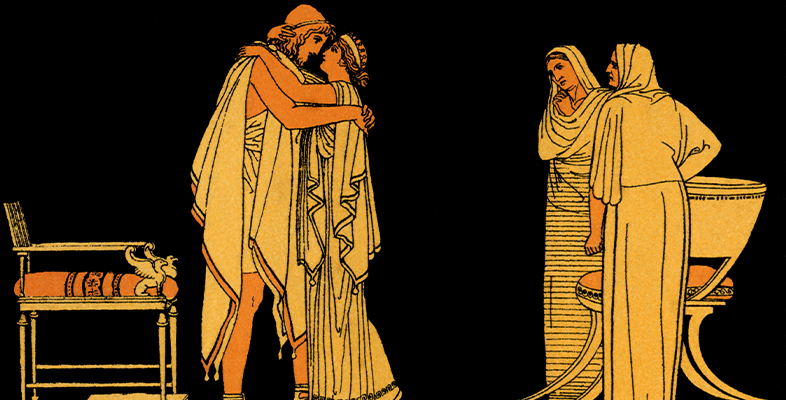3.1 Meeting Odysseus
Now you’ll think about how Homer introduces Odysseus, and what this might tell us about his character in the poem. Then you’ll consider how Penelope is introduced in the Odyssey.
Study note: referencing the Odyssey
The conventional way of referring to a section of the text of the Odyssey is to provide the book and line numbers. So the reference ‘Odyssey 1.1–5’ refers to Book 1, lines 1 to 5. You may also sometimes see ‘Odyssey’ abbreviated to ‘Od.’ (and ‘Iliad’ to ‘Il.’).
Activity 4
Read the opening lines of the Odyssey in the extract below once without making notes. (The opening words, ‘Tell me, Muse’, are a traditional call to one of the nine muses, divine figures who were thought to inspire the creative work of poets and other artists. The ‘man of many turns’ to whom the poet refers here is Odysseus.)
Then reread it as many times as you wish, considering the following question:
- What impression do we get of Odysseus on the basis of just these five lines of poetry?
Jot down three or four points. If you wish, you can pick out some words or short phrases from the text to support your points.
Tell me, Muse, of the man of many turns, who was driven
far and wide after he had sacked the sacred city of Troy.
Many were the men whose cities he saw, and learnt their minds,
many the sufferings on the open sea he endured in his heart,
struggling for his own life and his companions’ homecoming. [5]
Discussion
The opening of the Odyssey makes it clear that Odysseus has undergone a lot of adventures and faced many difficulties since the fall of Troy; he was ‘driven far and wide’ (Od. 1.1–2). We get the impression here of a courageous traveller who ‘endured in his heart’ (Od. 1.4) many sufferings. Line 5 also suggests that he was desperate to return home, and that his life was at stake.
You perhaps also got the impression even from just these few lines that the poet is making it very clear that Odysseus will be the centre of attention throughout this poem. The Greek text makes this even clearer than the translation you have just read. In the Greek the very first word of the whole poem is ἄνδρα (pronounced andra), which translates as ‘man’; this is a poem about a man so famous that the poet doesn’t even need to give his name, so sure is he that his audience will know who is being referred to.
